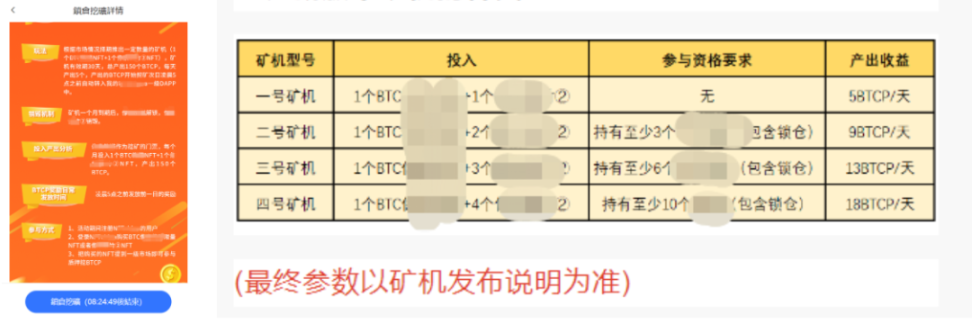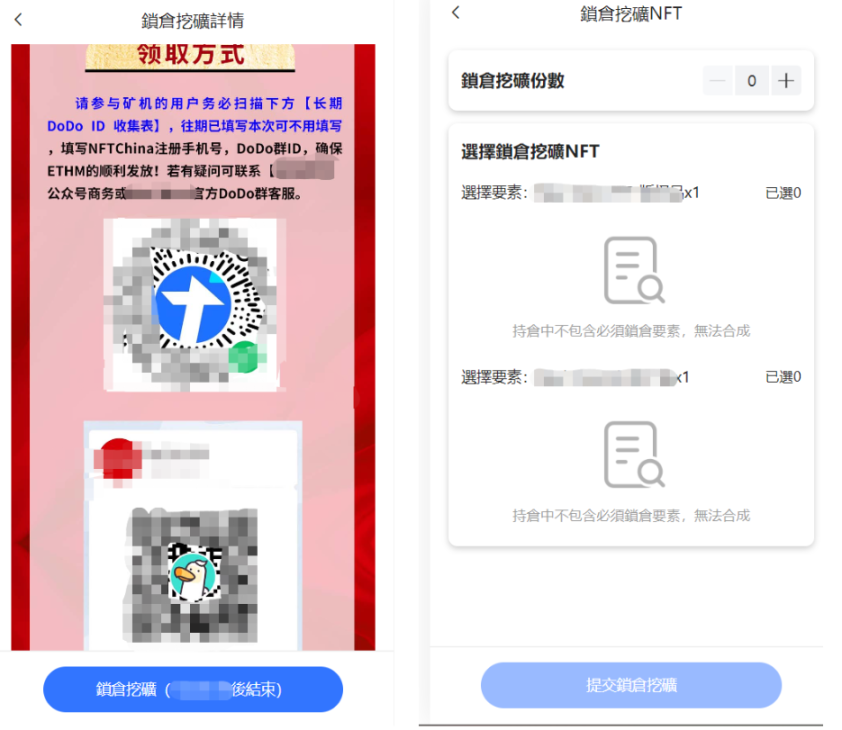Digital collectible collateral mining is a way to securitize digital collectible assets, providing users with additional income opportunities. However, platform operators still face a series of civil, administrative regulatory, and criminal risks.
By: Liu Honglin
More and more NFT platforms are no longer limited to issuance and consignment, but have also introduced NFT/digital collectible collateral mining mechanisms, which have enlivened the NFT/digital collectible market. Recently, many digital collectible platforms have successively launched collateral mining activities. Let's take a look at what digital collectible collateral mining is all about. Is it a legitimate and profitable business?
Note: In this article, the differences between digital collectibles and NFTs are temporarily not discussed.

Trading Mode
Digital collectible/NFT collateral mining (hereinafter referred to as "digital collectible mining") is a way for users to participate in mining activities by using their digital collectibles as "collateral."
In digital collectible collateral mining, users "pledge" their owned digital collectibles to the mining platform as proof of participation in mining. By "pledging" digital collectibles, users can receive corresponding mining rewards, such as platform tokens, digital collectibles, and more.
Therefore, digital collectible collateral mining is a new way to earn passive income in the cryptocurrency field. Holders can lock their digital collectibles in a smart contract to earn rewards, all without selling their digital collectibles.
In this way, it can continuously incentivize users to hold and trade digital collectibles, increase user retention and platform activity. Users can also use their digital collectibles to earn additional income and participate in the development of the digital collectible market, thereby increasing its market value.
Basic Gameplay
After our evaluation, different digital collectible platforms have different rules and requirements, but the basic mechanism for collateral mining is generally similar.

- Depending on the market conditions, the platform will release a certain number of mining machines at a specific time, with certain requirements for user input and participation in digital collectibles. The mining machines have a certain validity period (lock-up period);
- Participation method: Register a platform account, purchase or hold the collateral digital collectibles required for the mining activity, and participate in the lock-up mining channel at the start time;
- Destruction mechanism: At the end of the validity period, the "pledged" digital collectibles will be unlocked, and a portion of the digital collectibles will be destroyed as fuel consumption for the mining machines;
- Reward distribution: By participating in mining activities, users can receive mining rewards. These rewards may include platform tokens, digital collectibles, or other forms of income.
Compliance Evaluation
(I) Civil Legal Risks
Is the "pledge" of digital collectibles a genuine pledge?
Before exploring whether the pledge of digital collectibles belongs to the legal sense of pledge in our civil law, let's review the rights of buyers to digital collectibles. According to the current mainstream gameplay in the industry, consumers do not have ownership in the civil law sense of the NFT digital assets they purchase. Consumers also cannot prohibit others from accessing, copying, or disseminating the digital assets mapped by the NFT on the blockchain. What consumers have is only an exclusive right to the attribution of the NFT recorded on the blockchain.
Chinese law has strict regulations on collateral. The Civil Code stipulates two types of property rights: chattel mortgage and right of pledge. Although digital collectibles cannot be included in the scope of chattel mortgage or right of pledge, their use as collateral lacks legal basis and is not protected by law. At the same time, the "pledged" digital collectibles are locked during the period, and users cannot trade the digital collectibles during this period.
Does the "pledge" of digital collectibles involve contract risks?
In most cases, users do not sign contracts or agreements with the platform/mining provider before participating in digital collectible collateral mining. In other words, when disputes arise, there are no contracts or agreements to clearly define the rights and responsibilities of both parties, and users can only consult customer service to address their issues.
However, there is also another dilemma. Even if there is a contract between the user and the platform, it is still difficult to determine the validity of the contract in Chinese judicial practice.
Therefore, during the process of digital collectible collateral mining, if technical reasons or other factors lead to the destruction or loss of digital collectibles, or if users do not receive the promised output rights, the risk of users failing to protect their rights will greatly increase, leading to complaints or even large-scale collective complaints.

(II) Administrative Regulatory Risks
According to the "Notice on Further Preventing and Dealing with the Risks of Speculation in Virtual Currency Trading" issued by 10 ministries including the People's Bank of China and the Cyberspace Administration of China on September 15, 2021, "Virtual currency-related business activities are illegal financial activities. Conducting virtual currency-related business activities such as legal currency-to-virtual currency exchange, virtual currency-to-virtual currency exchange, buying and selling virtual currency as a central counterparty, providing information intermediary and pricing services for virtual currency trading, token issuance financing, and virtual currency derivative trading, etc., are suspected of illegal issuance of tokens or securities, unauthorized public offering of securities, illegal operation of futures business, illegal fundraising, and other illegal financial activities, all of which are strictly prohibited and will be strictly banned in accordance with the law. Those who engage in related illegal financial activities that constitute a crime will be strictly pursued for criminal responsibility."
Although according to the definition of virtual currency in the document, digital collectibles differ slightly from virtual currency, based on the technical characteristics of digital collectibles and the increasingly substantive determination of virtual currency by Chinese regulatory authorities, in specific situations, digital collectibles that are divorced from real commercial scenarios, lack commodity attributes, are only used as speculative objects, or even as financing tools, may still be classified as "virtual currency" (this point was also discussed in the article "Legal Compliance of X-Meta.HK, a Chinese NFT Digital Collectible Platform Expanding to Hong Kong").
In addition, the trading of digital collectible collateral mining projects is a typical financial investment activity, and this behavior is at great risk of being classified as illegal financial activity and subject to regulation.
So, will the expansion of digital collectible platforms to Hong Kong evade the above-mentioned regulatory risks? The article also believes that: Overseas virtual currency exchanges providing services to residents within China through the internet are also considered illegal financial activities. For the domestic personnel of related overseas virtual currency exchanges, as well as legal persons, non-legal persons, and individuals who knowingly or should have known that they are engaged in virtual currency-related business, and still provide marketing, payment settlement, technical support, and other services, they will be held accountable in accordance with the law.
Many digital collectible platforms actively embrace favorable policies in Hong Kong, expanding to Hong Kong to create NFT trading platforms. However, they still attract a large number of users from mainland China, who make up the vast majority of active users. Therefore, even if the platform expands to Hong Kong, as long as mainland Chinese users participate in NFT collateral mining activities on the platform, they will still be subject to strong regulation by relevant departments in China.
(III) Criminal Legal Risks
1. Digital collectible collateral mining projects may be involved in pyramid scheme crimes
According to Article 224-1 of the Criminal Law of China and Articles 2 and 7 of the "Regulations on Prohibiting Pyramid Selling," combined with the basic trading mechanism of digital collectible collateral mining projects, we can cautiously believe that there is a certain similarity in form between the requirement to hold specific digital collectibles for collateral mining and the entry fee for pyramid scheme crimes, which provides a disguise for illegal activities. Therefore, if the project adopts some marketing and promotion designs that involve recruiting others, hoping that investors will recommend other investors and the referrers will receive related rewards, rather than simply collateral storage mining, these projects often face charges of engaging in pyramid selling activities.
2. Digital collectible collateral mining projects may be involved in fraud crimes
We see that collateral mining projects will offer certain returns as rewards for users' mining activities. If digital collectible collateral mining projects use false advertising or exaggerated returns to attract investors to participate, and there is actual fraudulent behavior, the platform's relevant responsible parties may face charges and penalties for fraud.
3. Digital collectible collateral mining projects may be involved in money laundering crimes
Based on our past evaluation experience, overseas digital collectible platforms usually use hot wallets as a payment method. However, if the platform does not conduct "Know Your Customer" (KYC) verification of user transactions, and the transactions in digital collectible collateral mining projects are used for money laundering activities, such as using digital asset transactions and transfers to conceal the illegal sources and destinations of funds, the relevant responsible parties may be suspected of money laundering and face criminal prosecution.
Anti-money laundering is one of the important means for the international community to combat crime and terrorism. Its core regulatory measure is to strictly review the real-name system of transaction accounts. However, the decentralized, secretive, and cross-border circulation mechanisms and characteristics of digital assets under blockchain technology have brought new challenges to the current anti-money laundering system, but China's regulatory stance on money laundering activities remains strict. Therefore, platforms need to promptly face certain "KYC" regulatory requirements and improve their anti-money laundering mechanisms.
Conclusion
Digital collectible collateral mining is a way to securitize digital collectibles, providing users with additional income opportunities. We can foresee that digital collectible collateral mining will bring new opportunities, but platform operators still face a series of civil, administrative regulatory, and criminal risks.
Especially, the current laws and regulations in China do not recognize the existence of this trading mechanism. Users' investment behavior may not be protected by the law, which may lead to large-scale waves of rights protection, and platform operators often face significant criminal liability risks in this situation.
免责声明:本文章仅代表作者个人观点,不代表本平台的立场和观点。本文章仅供信息分享,不构成对任何人的任何投资建议。用户与作者之间的任何争议,与本平台无关。如网页中刊载的文章或图片涉及侵权,请提供相关的权利证明和身份证明发送邮件到support@aicoin.com,本平台相关工作人员将会进行核查。




